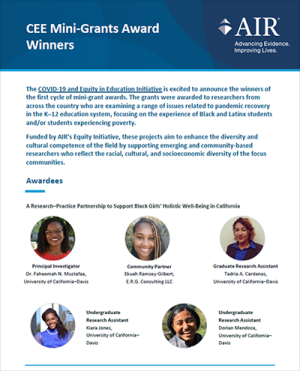The COVID-19 and Equity in Education Community of Researchers
Learn. Engage. Connect.
The COVID-19 and Equity in Education Community is a collaborative network of emerging, established, and local researchers dedicated to advancing equity in education through focused research and engagement on the pandemic and pandemic recovery experiences of Black and Latino students and/or students experiencing poverty.
Researcher Community Resources
Networking: The CEE Community offers opportunities to network with other researchers from across the nation who are exploring similar questions in a variety of local contexts.
Resources: Researchers will gain access to AIR’s longitudinal database, guiding frameworks and literature resources, and opportunities to apply for mini-research grants to support their research.
Events & Forums: Together, researchers will discover and share new and emerging research through annual convenings, an online forum, and quarterly newsletters.
Technical Working Group: Researchers will have the opportunity to connect and learn from the CEE Technical Working Group and to shape the direction of the initiative.
CEE Mini-Grants Award Winners

The COVID-19 and Equity in Education Initiative is excited to announce the winners of the first cycle of mini-grant awards. The grants were awarded to researchers from across the country who are examining a range of issues related to pandemic recovery in the K–12 education system, focusing on the experience of Black and Latino students and/or students experiencing poverty. View the PDF.
Funded by AIR’s Equity Initiative, these projects aim to enhance the diversity and cultural competence of the field by supporting emerging and community-based researchers who reflect the racial, cultural, and socioeconomic diversity of the focus communities:
- A Research-Practice Partnership to Support Black Girls’ Holistic Well-Being in California
- Compounded Adversity and Resilience During Crises: Student Homelessness in the Context of COVID-19 and Natural Disasters
- The Influence of COVID-19 on Racial Inequities in Academic Outcomes and Enrollment in California
- Promoting Mental Health Resilience and Mitigating COVID-19 Stressors in Middle School
Awardees
A Research-Practice Partnership to Support Black Girls’ Holistic Well-Being in California
Principal Investigator: Dr. Faheemah N. Mustafaa, University of California–Davis
Community Partner: Ekuah Ramsey-Gilbert, E.R.G. Consulting LLC
Graduate Research Assistant: Tadria A. Cardenas, University of California–Davis
Undergraduate Research Assistant: Kiara Jones, University of California–Davis
Undergraduate Research Assistant: Dorian Mendoza, University of California–Davis
In California and nationwide, Black girls are disproportionately disciplined and underexposed to identity-affirming school spaces that support their holistic well-being. The COVID-19 pandemic brought uneven effects for population-level well-being, with compounding impacts on Black youth. This partnership between Sacramento-based E.R.G. Consulting LLC and University of California researchers aims to contribute to the emerging body of knowledge and practice on supporting Black girls’ well-being. The team will document challenges and supports experienced by Black middle and high school girls in the greater Sacramento, CA region (qualitative component) and statewide (quantitative component) before, during, and after widespread COVID-related school closures. Implications for addressing systemic impacts of COVID-19 within historically marginalized student groups will be discussed.
Compounded Adversity and Resilience During Crises: Student Homelessness in the Context of COVID-19 and Natural Disasters
Co-Principal Investigators: Dr. Alexandra Pavlakis, Dr. Meredith Richards, and Dr. J. Kessa Roberts, Southern Methodist University
Graduate Research Assistant: Maria Hernandez
Houston, Texas, has suffered a rapid succession of disasters, including Hurricane Harvey (2017), the COVID-19 pandemic, and the power outage from Winter Storm Uri (2021), all which exacerbated existing racial and socioeconomic inequalities. Dr. Pavlakis, Dr. Richards, and Dr. Roberts will build on their ongoing work in the Houston area and partnerships with the Houston Educational Research Consortium and Houston Independent School District to understand how students and families experiencing homelessness, who are disproportionately Black and Latino, navigate the compounded adversities of natural disasters and the COVID-19 pandemic, along with how community resilience deepens understanding of their experiences through qualitative and geospatial mixed-methods approaches.
The Influence of COVID-19 on Racial Inequities in Academic Outcomes and Enrollment in California
Principal Investigator: Tiffany Jones
Consultant: Sophia Hwang
Advisory Committee Lead: Valerie Shapiro
The burden of the COVID-19 pandemic and the closure of physical schools was not shared equally. As a result of long histories of structural racism and the education debt, Black, Latino, and other students of color are more likely to live in areas with higher rates of COVID-19 and longer school closures compared with their White counterparts.
The proposed project aims to study the following: (a) the relationship between the disproportionate “pandemic burden” and school closures on student academic outcomes of attendance, mathematics, and English language arts proficiency, as well as graduation rates; (b) the extent of racial inequities in these outcomes, and whether pandemic burden, school poverty, and unemployment rates account for any increase in disparities; and (c) the relationship between pandemic burden and school closures on school enrollment and segregation.
It is crucial to understand the extent of the pandemic’s impact on students of color, given the education debt that has accumulated across generations. A comprehensive understanding of how the pandemic magnified already existing inequities for students of color, especially for Black and Latino students, will help communities reimagine how to advance equity in our education system.
Promoting Mental Health Resilience and Mitigating COVID-19 Stressors in Middle School
Principal Investigator: Dr. Maciel M. Hernandez, University of California–Davis
Graduate Research Assistant: Jamila Espinosa
School Contractor/Collaborator: Francisco Hernández
Latino youth in the United States often face limited academic opportunities and heightened mental health disparities. These disparities are more pronounced among Latino youth in rural communities with economic and structural constraints, underscoring the need for research on Latino children’s development anchored in youth’s lived psychosocial experiences. Yet targeted programs addressing rural youth’s mental health stressors are limited. The COVID-19 pandemic placed significant stress on students and exacerbated youth mental health concerns. In addition, the pandemic disproportionately affected California’s Central Valley, a region with a large Latino population, because of existing health inequities and greater high-risk work industry participation.
The proposed study will be a partnership of researchers from the University of California–Davis and teachers and administrators at Huron Middle School, a school that is in a primarily Latino (97%) rural community in California’s Central Valley. This project builds on prior research focusing on how school-based relationships and students’ sense of school belonging, which includes feeling connected to school, as well as cultural factors, promote positive academic and mental health outcomes. The team aims to assess mental health resilience as a critical component to fostering academic success in rural middle school students in the COVID-19 pandemic.
